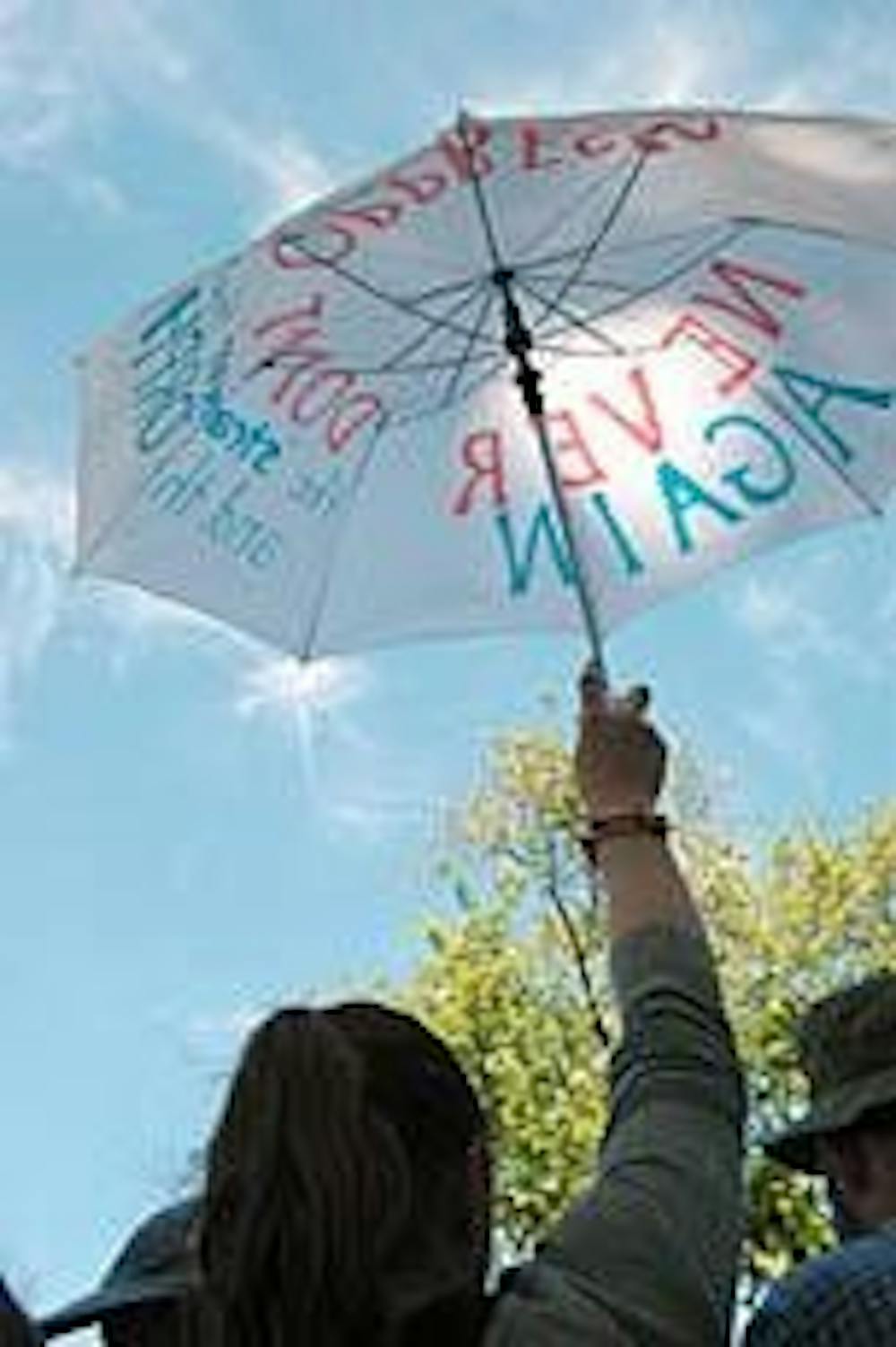A group of AU students joined thousands of protesters Sunday to culminate AU's Darfur Week of Action at the "Save Darfur: Rally to Stop Genocide" on the National Mall.
AU students marched from the Federal Triangle Metro station to the National Mall, chanting, "Hey, hey, ho, ho, genocide has got to go!" to the confusion of tourists. At the rally, they joined what master of ceremonies Joe Madison called "this rainbow, this sea of people that are here."
About 70 students attended the rally with the Darfur Action group, said Sarah Bularzik, a junior in the School of Communication. "It felt really good to be a big group of AU students," she said.
Matt Michels, a sophomore in the School of International Service, said overall attendance at the event was huge. "If you looked down past the Washington Monument, there were people all over," he said.
The rally's goal was to call on the federal government to stop the genocide in the Darfur region of Sudan.
"We need to provide more than just money," said Lt. Gov. Michael Steele, R-Md. "It's up to us to make certain that Darfur does not disappear."
Holocaust survivor Elie Wiesel said Americans should tell the government that citizens "want them to take risks and stop the massacre."
"Silence helps the killer, never his victims," Wiesel said.
Other speakers at the event included Senator Barack Obama, D-Ill., Rep. Nancy Pelosi, D-Calif., actor George Clooney, hip-hop mogul Russell Simmons and Assistant Secretary of State for African Affairs Jendayi Frazer.
President Bush endorsed the rallies on Friday, according to an article in The Washington Post.
"I want the Sudanese government to understand the United States of America is serious about solving this problem," Bush said.
The Sudanese Embassy in Washington issued a statement that the rally would harm peace talks between the government and the rebels, according to The Post. "By implication, the message that will be sent by the demonstrators to the Darfur rebels is: Don't Make Peace. The U.S. supports you," the statement said.
Other events during AU's week included screenings of "Hotel Rwanda" and "Sometimes in April," a Sudanese dinner, a speakers' panel and a lobby day at Congress. There was also a model refugee camp on the quad.
The events were sponsored by AU Amnesty International, AU Methodists, the Jewish Student Association, Hillel, One World, CASJ, the Student Organization for African Studies, SEPGA, the Jewish Greek Council, KESHER, Kay Interfaith Council and Darfur Action.
Many on-campus religious groups have followed the lead of national organizations and joined the movement to end the genocide. Luke Pepper, co-leader of the AU United Methodist Student Association social justice committee, said almost all faiths are represented in some way in the movement.
"When violence and injustice occurs in the world, the faith community and its ministry is prevented from ministering to the people and should do what it can do to defend all people," he said.
The Catholic Student Association, Muslim Student Association and Kay Interfaith Council have issued statements condemning the genocide and endorsing the Undergraduate Senate's recently passed divestment bill, which recommends AU stop investing in companies who do business with the Sudanese government, The Eagle previously reported.
Ultimately, the support of religious organizations may be one of the strongest assets to ending the conflict.
"People of faith are one of the strongest moral voices in the public conversation on any issue," said the Rev. Mark Schaefer, AU's United Methodist chaplain. "Churches are natural constituencies that can help to motivate those in elected office. [They] provide networks of people who care about particular issues and who can mobilize to throw their support behind certain efforts."
The conflict in Darfur, the western region of Sudan, began in 2003. Rebels claim the government in the capital city of Khartoum is oppressing black Africans in favor of Arabs. These rebel groups have been attacking government targets, according to the BBC.
The Sudanese government admits to mobilizing "self-defense" forces but denies any link to the Janjaweed, an Arab militia "accused of trying to 'cleanse' large swathes of territory of black Africans," according to the BBC. Refugees from the area say that after air raids by government air craft, the Janjaweed enter villages and kill the men and rape the women. Estimates vary, but approximately three million people have been displaced and nearly 200,000 have been killed, according to the BBC.
"What I saw in Darfur is exactly what was going on in Rwanda," said Paul Rusesabagina at the rally Sunday. The movie "Hotel Rwanda" is based on Rusesabagina's experiences aiding refugees in the conflict in Rwanda.
"What I saw in Darfur is a disaster," he said.





